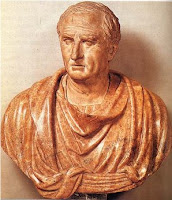Cui bono?
 I have held off commenting on the latest announcement from the Bishops Conference of England and Wales regarding Holydays in the Extraordinary Form because I am not quite sure what is being attempted here.
I have held off commenting on the latest announcement from the Bishops Conference of England and Wales regarding Holydays in the Extraordinary Form because I am not quite sure what is being attempted here. It seems that if Mass is celebrated on Ascension Thursday Sunday in the older form of the rite, the Sunday after Ascension should be suppressed and the Mass of the Ascension should be celebrated instead. Not the most brilliant idea in liturgical terms but we could cope with that. But the more important question is over celebrations on the actual days. Are we to take it that those people who want to go to a traditional Mass on Corpus Christi despite there no longer being any obligation to do so are to be prevented?
If this is the case, I am reminded of Cicero's question "Cui bono?" - to whom will this be a benefit? What possible good could be achieved by prohibiting people from voluntarily coming to Church to worship God on a feast day hallowed by centuries of tradition?
The text of the response to the dubium has not yet been published so we will have to see what it actually says. I wonder if it is possible to prevent any celebration of a votive Mass of Corpus Christi on 22 May or of All Saints on 1 November; and again, what possible benefit could be achieved by trying to do so?
Damien Thompson has written about this in his post A petty victory for liberal bishops. I expect that one or two people might want to ask Cardinal Hoyos about this when he visits England in June.
